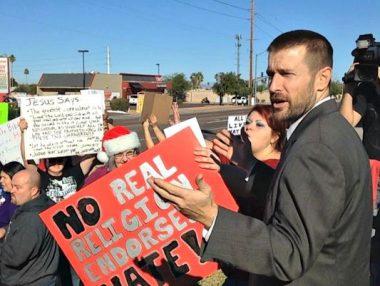
I am the type of person who likes to help other people. I find it easy to offer help and support to those who are in need. When I see a vehicle broken down along the road, I usually stop see if I can be of assistance. When I see an elderly person struggling to get a can of soup off the top shelf at the grocery store, I volunteer to get the can for her. I pay attention to my surroundings, and this allows me to be helpful when appropriate. I suspect this is one of the reasons I became a pastor, and if I had the necessary training I would today be a social worker or would work in some other profession that allowed me to be of assistance to others. This doesn’t mean that I am perfect or that I always do right by other people. I can be, in certain circumstances, an asshole who is indifferent to the plight of others around him. On balance, however, I do my best to help others.
One thing I’ve learned over the years is that some people don’t want help. You can see their need and know exactly what must happen to fix it, yet when you offer your help, it is rejected. In this post, I want to tell a story about a family which graphically illustrates the fact that some people are beyond help. I first met this family in the 1980s when the mother and her children began attending the church I was pastoring at the time. They were poorly dressed and smelled as if they hadn’t had a bath in weeks, but I welcomed them into our congregation. The mother had serious mental health problems, but because, at the time, I thought psychiatrists and psychologists were tools used by Satan to corrupt the minds of the followers of Jesus, all I could offer her was friendly advice, salvation, and prayer.
One day, I decided to visit this family at their home. We were in the midst of a revival meeting at the time, so I brought the evangelist with me. As we entered the home, I could not believe my eyes. Everywhere I looked I saw filth. It was evident that the family was what we now call a hoarder. The sink and counters were overflowing with dishes that hadn’t been washed in weeks. A wringer washer sat in the corner, filled with dishes. Climbing on the counter, in and out of the cabinets, and on the stove and toaster were more cockroaches than I could count. As I moved into the main part of the home, the floors were covered with clothing. I would later learn that the family rarely did laundry, and when they wanted something to wear they would just dig it out of one of the clothing piles on the floor. The house smelled as any house would which was filled with unwashed humans and dishes and un-laundered clothing. Little did I know that the bathroom tub was partially filled with used tampons and menstrual pads. No one could take a bath because there was no place to take it.
My reason for visiting them was to evangelize the husband. I sat down with him on the couch and shared with him the gospel. During my sharing, I watched as cockroaches climbed up and down the man’s legs. Fortunately for me, he prayed the sinner’s prayer and became a Christian. For the next decade, he and his family would faithfully attend church every time the doors were open, and if I needed him to help with a project at the church, they were always happy to help. From this perspective, they were not bad people. I’ve met more than a few well-dressed, nice-smelling Christians who were mean-spirited sons-of-bitches who believed that giving their tithe exempted them from helping at church. I learned long ago that you can’t judge people by how they dress or whether they use deodorant every day.
After leading the husband Christ, I decided to take it upon myself to “help” this family clean up their act. The joke around town was that if their home ever caught on fire, it would infest the entire community with roaches. People knew that this family attended the church I pastored, so I thought for testimony’s sake, it would be best if they cleaned up their home, washed their clothes, and occasionally took a bath. The wife admitted that she knew that they needed to clean things up, so I took her admission as an open door for me to work my magic. All I wanted to do is “help” them. I talked to Polly and some of the ladies of the church about the possibility of them cleaning this couple’s home. I can still visualize the looks I got from Polly and the other women I was speaking to. They knew how awful it was at this family’s home. They knew all about the filth and the roaches. I implored them to consider what Jesus would have them do. 🙂 Here was an opportunity for us to “minister” to a family in need. The men, once the house was in order, would help the husband clean up the exterior of the house. It too looked like a bomb had exploded.
On the appointed day, the ladies of the church entered this family’s home to begin what was expected to be a multiple-day cleaning project. These women gagged their way through gathering up bags of trash, clothing, broken household items, and debris and piling them in the backyard. By early evening, they had a ten-foot-wide by ten-foot-tall pile of black trash bags in the backyard. The ladies promised that they would return on day two to continue their cleaning effort. One lady, an hour or so later, drove by this family’s house. She was shocked to find the husband and wife, along with their children, in the backyard digging into the bags and hauling stuff back into the house. She called me later that night and told me what she had seen. She then said to me, preacher, please don’t make us go back to their house again.
I was, of course, infuriated by this couple’s behavior. I drove over to their home and investigated the matter for myself. Sure enough, the pile was smaller than it had been a few hours earlier. I gave them a what for and told them that the ladies would not be back. That was fine by them. They were happy with things as they were. I learned for the first time that despite my good — albeit naive — intentions and desire to help others, some people don’t want to be helped. Change is hard, and for this family, living in a filthy, debris-strewn home was all they had ever known. I later met this couple’s parents, and I then knew exactly where their lack of basic housekeeping skills and body care came from. Their homes were much like this couple’s home, including cockroaches crawling to and fro. This experience aptly reminded me of the old adage that you can lead a horse to water, but you can’t make him drink.
This couple needed help, but deeply ingrained habits kept them from accepting it. Several years later, a traveling evangelist came to our church to hold a meeting. A week or so after the meeting’s conclusion, the evangelist called me and let me know that their new travel trailer was infested with roaches. I asked him if so-and-so had given them any groceries. He replied, why, Brother, yes they did. They gave us several food items, including a big bag of potatoes. I laughed, and replied, that’s where your roaches came from! I advised him that, in the future, he should not accept food donations from this family. He wisely heeded my advice. Such is the life of a rural small-town Baptist preacher.
I am in no way denigrating the family in this story. They were, in many ways, wonderful people. Challenging to be sure, but I felt that they always loved and respected me as their and would do anything to be a help to my family or the church. Decades later, I now know that the reasons for their way of life were psychological in nature, and what they really needed was professional therapy. Of course, at the time, I wrongly believed that Jesus was the answer for everything. I now know that Jesus doesn’t sweep floors, scrub toilets, or wash laundry. What this family really needed couldn’t be found at church.
Bruce Gerencser, 68, lives in rural Northwest Ohio with his wife of 47 years. He and his wife have six grown children and sixteen grandchildren. Bruce pastored Evangelical churches for twenty-five years in Ohio, Texas, and Michigan. Bruce left the ministry in 2005, and in 2008 he left Christianity. Bruce is now a humanist and an atheist.
Your comments are welcome and appreciated. All first-time comments are moderated. Please read the commenting rules before commenting.
You can email Bruce via the Contact Form.


 When people come to the church office asking for money, I ask them where they went to church on Sunday. If they name another church, I tell them to go ask that church for money. If you have an account at Bank of America, you don’t walk into Wells Fargo asking to make a withdrawal. The truth is, most of these people don’t go to church anywhere, and there are certain criteria in the Bible about who we are supposed to help.
When people come to the church office asking for money, I ask them where they went to church on Sunday. If they name another church, I tell them to go ask that church for money. If you have an account at Bank of America, you don’t walk into Wells Fargo asking to make a withdrawal. The truth is, most of these people don’t go to church anywhere, and there are certain criteria in the Bible about who we are supposed to help.